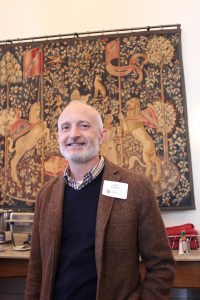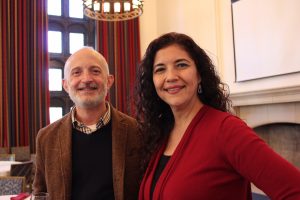Alumnus Mark Bersano Managing Growth of Continuing Education at IPS
January 23, 2018
IPS is now home to the Chicago Catholic Scripture School, a program that provides in-depth knowledge of the Bible within a Roman Catholic framework to parish leaders, deacons, catechists, staff members, and anyone wishing to deepen their understanding of scripture. The IPS Chicago Catholic Scripture School (IPS CCSS) falls under the Continuing Education (CE) umbrella within IPS and is overseen by IPS alumnus, Mark Bersano.
With the help of CE administrative assistant Mirta Garcia, Mark also supervises the following CE programs:
- Parish Leadership and Management Programs
- IPS Continuing Education Courses
- Parish Health and Pastoral Care Ministry Certificate
- Restorative Justice Ministry Certificate
- Certificate in Pastoral Ministry for North England and Wales
- English Pronunciation and Parish Enculturation Course
- Legacy Leaders Fellowship Program (Check out our recent blog “Loyola-IPS Receives Grant from Henry Luce Foundation for Legacy Leaders Fellows Program”.)
- IPS Retreats for Catholic School Teachers
We recently sat down with Mark to learn more about him and his growing contribution to the life of IPS.

Let’s begin with CONGRATULATIONS on your recent promotion to Assistant Dean for Continuing Education, Mark! Any thoughts on this recognition?
It’s a great honor and I’m proud and very grateful to have the new title. It affirms the work Mirta and I are doing with Continuing Education and the importance of this work to the community. I’m both grateful and humbled. The title change should open more doors as I negotiate new Continuing Education programs and course offerings.
I understand you’re an IPS alumnus. Can you tell us a little bit about what you were doing prior to enrolling at IPS?
Before coming to Loyola in 2005, I was the Chief Deputy Recorder and Director of Technology for the Will County Recorder of Deeds Office in Joliet. I was a one-person computer department, overseeing and maintaining six servers, 75 user workstations, and a 20-million record database. I oversaw RFP’s for hardware and software; configured and maintained servers, databases, and networking equipment; trained users; improved process efficiency; and basically administered every piece of equipment in the office. When I came to IPS I often joked that I no longer wanted to deal with anything that had an electrical plug.
Why did you choose IPS? What did you study?
A colleague in the Management Information Systems Department in Will County was doing her MA in Pastoral Studies with IPS. She told me about a new MA in Social Justice degree that IPS was starting. I came in and spoke with Mary Elsbernd (who oversaw the Social Justice MA at that time), and was enrolled in the very first social justice course in the summer of 2005. I was impressed with the Jesuit ideals around social justice and the way IPS offered a transformational education experience. After the first course, I was hooked and ended up working with a major university grant project while I pursued my studies for the MASJ.
What was life like as an IPS student? Any particular memories of classes, characters, etc. that remain with you to this day?
Classes were wonderful—with so many interesting people as both instructors and classmates. Discussions were always rich and courses were challenging and thought provoking. The semester that stands out the most for me was Spring 2008—my final semester. I took Hearts on Fire to learn about Ignatian Spirituality at the same time as a Nonviolence class based in Franciscan teaching. The courses complemented each other and I felt quite steeped in the two traditions. When the Hearts on Fire course ended, no one wanted to leave the classroom. We stayed after the last session for a couple of hours just chatting. I’m still in touch with some of those classmates, nearly 10 years later.
How did you become the Coordinator of Continuing Education (CE) here at IPS?
While I was working on my MASJ degree, I worked for a Lilly Grant called INSPIRE. It was a partnership between LUC and the Archdiocese of Chicago that supported teambuilding on the staffs of Catholic parishes. When I graduated, I went to work for the grant full time. When the grant ended, my current role was created to extend the learning of INSPIRE into the future, and now I am in charge of all Continuing Education programs that IPS provides.
What is your mission as Assistant Dean for Continuing Education?
My mission is to provide engaging non-degree educational opportunities to people in parishes and congregations who wish to supplement their knowledge in service of the Church. This role developed out of the INSPIRE project, which ended in 2013. I have been working at IPS in this capacity since 2014.
How is your IPS degree allowing you to fulfill your goals as Assistant Dean for Continuing Education at IPS?
My social justice degree coupled with my work with INSPIRE provided me with a wonderfully supportive network of people in diocesan and congregational roles. I also got a great understanding of the educational needs of people in parishes. Armed with these tools, I’m able to effectively interface with a wide variety of people, assess needs, and create educational opportunities to address those needs. My office aspires to be flexible in order to address continuing education needs in real time as they surface.
You and Mirta continue to service an increasing number of constituencies. What are the highlights/challenges associated with such growth?
The highlight is certainly that we have the opportunity to do a lot of different things with a very diverse group of people. For example, we’re working on a new restorative justice ministry. New ideas and opportunities are always arising, and we’re able to act on them relatively quickly. The challenge is that with so many projects, it can be difficult for two of us to keep up! We’re creating projects based on innovative ideas at a much faster rate than we can make them reality.

Can you share a personal spiritual practice that a fellow IPS community member may find helpful?
At night before bed, I try to assess what’s going on with me—an examen of sorts. I try to move into an “observer” mode. I look at my emotions, knowing that they are not me. I look at my thoughts, knowing that they are not me. I look at my body and any pains or physical sensations—knowing that they are not me. I look at all of the things stimulating my emotions and thoughts, knowing that they are not me. I recall that I am consciousness—the observer of all these things. That’s me. It’s a very emotionally grounding and calming exercise.
Any words of wisdom for IPS students unsure about how their current studies will manifest concretely down the line?
Stay present. Learn. Absorb. Build relationships. You never know how what you learn or who you meet will manifest in your life later. It’s part of the great mystery.
You can reach Mark Bersano at mbersan@luc.edu.
